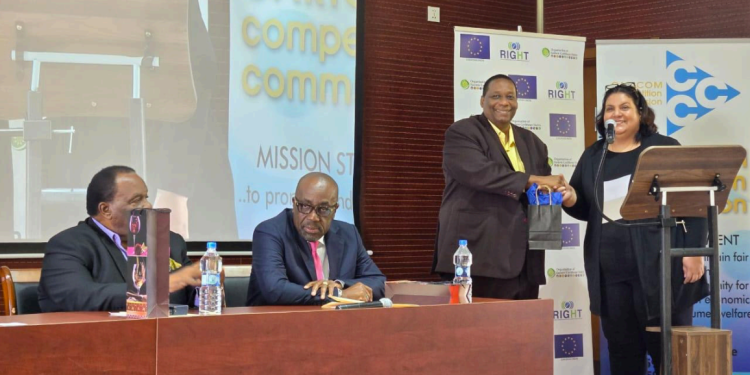The Ministries of Legal Affairs and Trade are combining resources to mount a two-day high-level workshop on competition policy and enforcement law.
Organised by the OECS Commission and the CARICOM Competition Commission (CCC), under the 11th EDF-Right Project, the 10-11 March workshop is being held at the Villa Polytechnic Clinic and it brings together government officials, statutory bodies, private sector, regional institutions.
One of the main outcomes of the workshop is the sensitisation of key principles of competition law and institutional elements required for its enforcement.
In his address to the opening ceremony, Foreign Affairs and Trade Minister, E.P Chet Greene noted that the Revised Treaty of Chaguaramas mandates that CARICOM member states enact national competition laws and establish competition authorities. This, he noted, is not merely a legal obligation but a moral and socioeconomic imperative to ensure that the benefits of economic integration are not eroded by anti-competitive practices.
“Lest we forget that competition law and policy are foundational to a successful market economy. They establish rules that unleash the potential of producers, service providers, and investors, ensuring optimal market function, encouraging innovation, and protecting consumers from monopolistic and other undesirable business practices. Moreover, these laws and policies foster a level playing field where businesses, regardless of size, can compete fairly, and the benefits of economic growth are equitably distributed,” he stated.
Also addressing the opening was Permanent Secretary in the Ministry of Trade, Ambassador Clarence E. Pilgrim who underscored the important role of competition to the success of business enterprises. “A robust competition regime directly impacts trade performance. When businesses operate under transparent and competitive conditions, they become more efficient, innovative, and capable of seizing export opportunities. Conversely, anti-competitive practices drive up costs, dampen productivity, and diminish our ability to compete globally,” he noted.
For Antigua and Barbuda, he emphasized that establishing administrative mechanisms to support competition law, policy, and enforcement is critical. “This includes developing regulatory frameworks that address both traditional markets and emerging digital economies, ensuring they are agile enough to adapt to technological advancements,” he explained.
On Day Two of the workshop, participants will explore the institutional and legislative framework for competition law enforcement, focusing on key design considerations, enforcement mechanisms, and the relationship between competition law and consumer protection. The day will conclude with a discussion on actionable steps for implementing competition law and policy in Antigua and Barbuda



